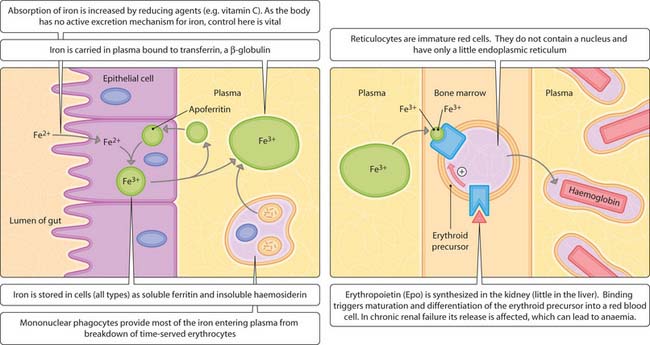16 Agents used in the treatment of anaemia
Normal red blood cell (RBC) production requires erythropoietin, vitamin B12 (cobalamin), folic acid and iron (Fig. 3.16.1) and deficiency in any of these cofactors can cause anaemia. Symptoms reflect a decrease in the oxygen-carrying capacity of red blood cells and include pallor, shortness of breath and fatigue.
Treatment of anaemias
Iron supplements
A common cause of anaemia is iron deficiency in chronic blood loss (menstruation), in pregnancy and in pathological blood loss (e.g. from gastrointestinal bleeding). Diagnostically, RBCs appear small (microcytosis). Treatment with iron supplements (ferrous sulphate, oral) may cause gastrointestinal irritation in some subjects, which can be minimized by ingestion with food. Parenteral administration (i.v.) is required for those with chronic bleeding disorders and, therefore, cannot tolerate oral administration. In certain circumstances, iron toxicity can be fatal, particularly in children who inadvertently overdose on iron supplements or in individuals with β-thalassaemia and who require regular blood transfusions (iron load is increased). The body does not have a mechanism to excrete excess iron but iron levels can be corrected with the use of selective iron chelators such as desferrioxamine (Fig. 3.16.1).
Stay updated, free articles. Join our Telegram channel

Full access? Get Clinical Tree





